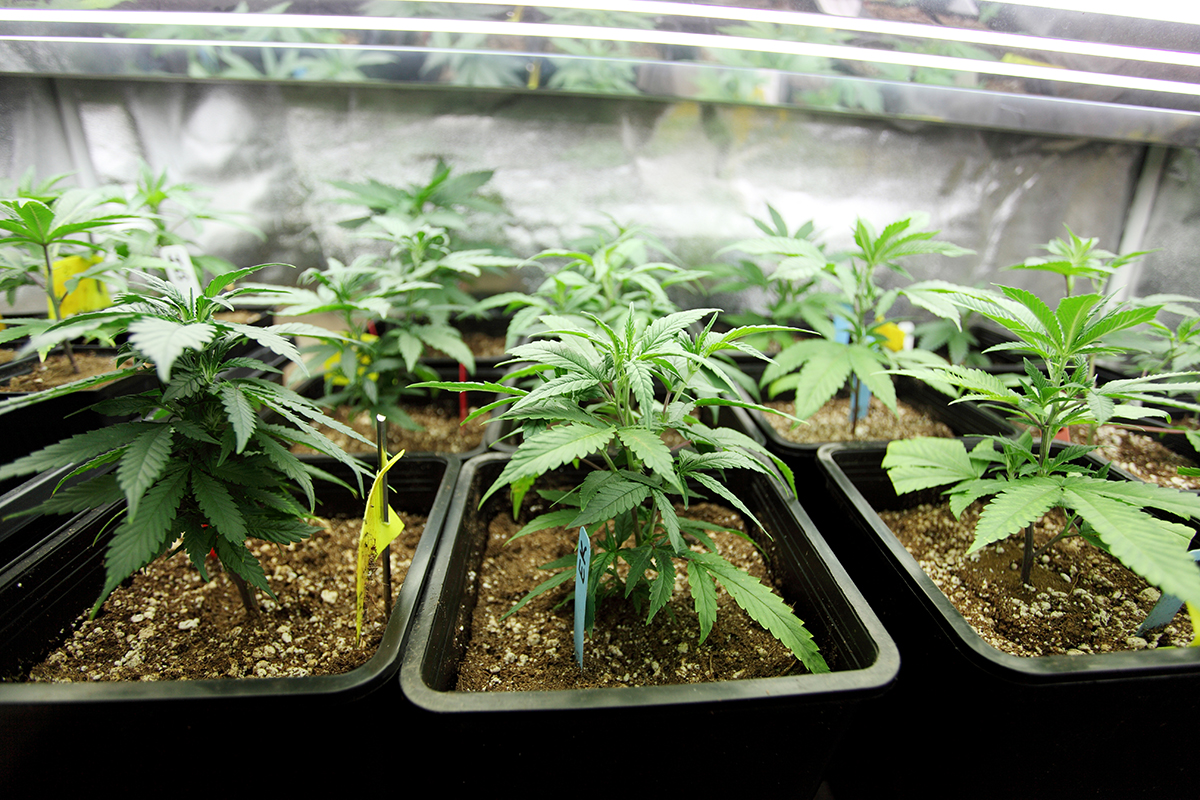Beacon Hill Really Doesn’t Want Voters to Legalize Pot

Marijuana crop growing indoors via Shutterstock
A brutal new report from the State Senate makes one thing quite clear: Beacon Hill is not looking forward to voters approving a marijuana legalization ballot initiative in November.
The report, by the Senate Special Committee on Marijuana, is perhaps the most thorough deep dive into the plant’s relationship with the Commonwealth. The report covers the habits of marijuana consumers in Massachusetts, the changes the state has witnessed since the marijuana liberalization effort began in earnest in 2008, and in the harshest of terms, outlines the extensive policy challenges the state would face if the drug is legalized.
The report found a litany of potential problems with legalization ranging from children having easier access to marijuana to the need for a new regulatory framework for enforcement purposes. The positive aspects of legalization, like the birth of a $500 million industry and the creation of tens of thousands of new jobs, received less only a few paragraphs in the 118-page report.
During an hour-long press conference tied to the report’s release, the committee’s members went out of their way to say the report was meant as a guidebook for policy makers, not as a recommendation on the November ballot question. “It was not the charge of the committee to take a position on legalization or the ballot question,” said Sen. Jason M. Lewis of Winchester, though he did add the committee has significant concerns about legalization and urged voters to take a “cautious approach” to legalization.
Lewis pushed back when he was pressed on the real world likelihood of the legalization initiative passing by a wide margin this fall.
“I don’t think there’s any forgone conclusion about what is going to happen in November. There’s a long way to go,” said Lewis.
Massachusetts voters strongly supported marijuana liberalization efforts at the ballot box when they voted to decriminalize it and legalize its use for medical purposes in 2008 and 2012, respectively. A recent poll from WBZ showed 53 percent of Massachusetts voters support the ballot initiative to legalize it completely, a number that seems in line with recent voting patterns on marijuana issues.
The report is the latest bipartisan salvo from the state’s political establishment against the effort to legalize marijuana in Massachusetts. At the press conference, legislators made it clear that they have no interest in tackling marijuana legalization before it goes to the voters, so it is likely they will tweak the law after it is passed in November, a rare but not unprecedented occurrence on Beacon Hill.
“I have no doubt that the legislature will respect the will of the voters. At the same time, when somebody is voting in November, assuming this is on the ballot, I doubt that they will be thinking about whether you should be allowed to grow six plants at home, or 12 plants or no plants, and I doubt they’ll be thinking about whether the tax rate should be 3.75 percent, or whether it should be an excise tax versus a sales tax,” said Lewis.
The marijuana legalization ballot initiative, sponsored by the Campaign to Regulate Marijuana Like Alcohol, does leave lawmakers with unanswered questions, particularly when it comes to taxes. The committee found the special tax rate for marijuana to be too low, proposing instead an excise tax of 5-15 percent, a marijuana specific sales tax of 10-20 percent, and an additional local option tax of up to five percent.
A provision in the initiative that allows for individuals to grow up to 12 marijuana plants in the comfort of their home was of such great concern to the committee, they proposed eliminating it all together.
Several lawmakers on the committee were worried about regulating the potency of marijuana when it becomes legalized. Even though only one of them publicly copped to trying it in college, they all claimed that today’s marijuana is much stronger today than it was when they were in school.

